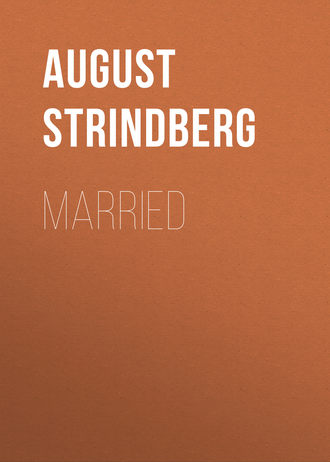
August Strindberg
Married
THE BREADWINNER
He wakes up in the morning from evil dreams of bills which have become due and copy which has not been delivered. His hair is damp with cold perspiration, and his cheeks tremble as he dresses himself. He listens to the chirruping of the children in the next room and plunges his burning face into cold water. He drinks the coffee which he has made himself, so as not to disturb the nursery maid at the early hour of eight o’clock. Then he makes his bed, brushes his clothes, and sits down to write.
The fever attacks him, the fever which is to create hallucinations of rooms he has never seen, landscapes which never existed, people whose names cannot be found in the directory. He sits at his writing table in mortal anguish. His thoughts must be clear, pregnant and picturesque, his writing legible, the story dramatic; the interest must never abate, the metaphors must be striking, the dialogue brilliant. The faces of those automata, the public, whose brains he is to wind up, are grinning at him; the critics whose good-will he must enlist, stare at him through the spectacles of envy; he is haunted by the gloomy face of the publisher, which it is his task to brighten. He sees the jurymen sitting round the black table in the centre of which lies a Bible; he hears the sound of the opening of prison doors behind which free-thinkers are suffering for the crime of having thought bold thoughts for the benefit of the sluggards; he listens to the noiseless footfall of the hotel porter who is coming with the bill....
And all the while the fever is raging and his pen flies, flies over the paper without a moment’s delay at the vision of publisher or jurymen, leaving in its track red lines as of congealed blood which slowly turn to black.
When he rises from his chair, after a couple of hours, he has only enough strength left to stumble across the room. He sinks down on his bed and lies there as if Death held him in his clutches. It is not invigorating sleep which has closed his eyes, but a stupor, a long fainting fit during which he remains conscious, tortured by the horrible thought that his strength is gone, his nervous system shattered, his brain empty.
A ring at the bell of the private hotel! Voilà le facteur! The mail has arrived.
He rouses himself and staggers out of his room. A pile of letters is handed to him. Proofs which must be read at once; a book from a young author, begging for a candid criticism: a paper containing a controversial article to which he must reply without delay, a request for a contribution to an almanac, an admonishing letter from his publisher. How can an invalid cope with it all?
In the meantime the children’s nurse has got up and dressed the children, drunk the coffee made for her in the hotel kitchen, and eaten the rolls spread with honey which have been sent up for her. After breakfast she takes a stroll in the park.
At one o’clock the bell rings for luncheon. All the guests are assembled in the dining-room. He, too, is there, sitting at the table by himself.
“Where is your wife?” he is asked on all sides.
“I don’t know,” he replies.
“What a brute!” is the comment of the ladies, who are still in their morning gowns.
The entrance of his wife interrupts the progress of the meal, and the hungry guests who have been punctual are kept waiting for the second course.
The ladies enquire anxiously whether his, wife has slept well and feels refreshed? Nobody asks him how he feels. There is no need to enquire.
“He looks like a corpse,” says one of the ladies.
And she is right.
“Dissipation,” says another.
But that is anything but true. He takes no part in the conversation, for he has nothing to say to these women. But his wife talks for two. While he swallows his food, his ears are made to listen to rich praise of all that is base, and vile abuse of all that is noble and good.
When luncheon is over he takes his wife aside.
“I wish you would send Louisa to the tailor’s with my coat; a seam has come undone and I haven’t the time to sew it up myself.”
She makes no reply, but instead of sending the coat by Louisa, she takes it herself and walks to the village where the tailor lives.
In the garden she meets some of her emancipated friends who ask her where she is going.
She replies, truthfully enough, that she is going to the tailor’s for her husband.
“Fancy sending her to the tailor’s! And she allows him to treat her like a servant!”
“While he is lying on the bed, taking an after-dinner nap! A nice husband!”
It is quite true, he is taking an after dinner nap, for he is suffering from anaemia.
At three o’clock the postman rings again; he is expected to answer a letter from Berlin in German, one from Paris in French, and one from London in English.
His wife, who has returned from the tailor’s and refreshed herself with a cognac, asks him whether he feels inclined to make an excursion with the children. No, he has letters to write.
When he has finished his letters, he goes out for a stroll before dinner. He is longing for somebody to talk to. But he is alone. He goes into the garden and looks for the children.
The stout nurse is sitting on a garden seat, reading Mrs. Leffler’s True Women which his wife has lent her. The children are bored, they want to run about or go for a walk.
“Why don’t you take the children for a walk, Louisa?” he asks.
“Mistress said it was too hot.”
His wife’s orders!
He calls to the children and walks with them towards the high road; suddenly he notices that their hands and faces are dirty and their boots in holes.
“Why are the children allowed to wear such boots?” he asks Louisa.
“Mistress said....”
His wife said!
He goes for a walk by himself.
It is seven o’clock and dinner-time. The ladies have not yet returned to the hotel. The two first courses have been served when they arrive with flushed faces, talking and laughing loudly.
His wife and her friend are in high spirits and smell of cognac.
“What have you been doing with yourself all day, daddy?” she asks her husband.
“I went for a walk with the children.”
“Wasn’t Louisa there?”
“Oh! yes, but she was otherwise engaged.”
“Well, I don’t think it’s too much to ask of a man to keep an eye on his own children,” says the friend.
“No, of course not,” answers the husband. “And therefore I scolded Louisa for allowing the children to run about with dirty faces and worn-out boots.”
“I never come home but I am scolded,” says the wife; “You spoil every little pleasure I have with your fault-finding.”
And a tiny tear moistens her reddened eyelids. The friend and all the rest of the ladies cast indignant glances at the husband.
An attack is imminent and the friend sharpens her tongue.
“Has anybody here present read Luther’s views on the right of a woman?”
“What right is that?” asks his wife.
“To look out for another partner if she is dissatisfied with the one she has.”
There is a pause.
“A very risky doctrine as far as a woman’s interests are concerned,” says the husband, “for it follows that in similar circumstances a man is justified in doing the same thing. The latter happens much more frequently than the former.”
“I don’t understand what you mean,” says the wife.
“That’s neither Luther’s fault nor mine,” answers the husband. “Just as it is not necessarily the husband’s fault if he doesn’t get on with his wife. Possibly he would get on excellently with another woman.”
A dead silence follows; the diners rise from their chairs.
The husband retires to his own room. His wife and her friend leave the dining-room together and sit down in the pavilion.
“What brutality!” exclaims the friend. “How can you, a sensitive, intelligent woman, consent to be the servant of that selfish brute?”
“He has never understood me,” sighs the wife. Her satisfaction in being able to pronounce these damning words is so great, that it drowns the memory of a reply which her husband has given her again and again:
“Do you imagine that your thoughts are so profound that I, a man with a subtle brain, am unable to fathom them? Has it never occurred to you that it may be your shallowness which prevents you from understanding me?”
He sits down in his room, alone. He suffers from remorse, as if he had struck his mother. But she struck the first blow; she has struck him blow after blow, for many years, and never once before has he retaliated.
This coarse, heartless, cynical woman, in whose keeping he confided his whole soul with all its thoughts and emotions, was conscious of his superiority, and therefore she humiliated him, dragged him down, pulled him by the hair, covered him with abuse. Was it a crime that he struck back when she publicly taunted him? Yes—he felt as guilty as if he had murdered his dearest friend.
The twilight of the warm summer night deepens and the moon rises.
The sound of music from the drawing-room floats through his window. He goes into the garden and sits down under a walnut tree. Alone! The chords of the piano blend with the words of the song:
When the veil of night was drawn
And crowded earth, mysterious sea
Became one sweet, enchanted ground
For us, until the starless dawn
Dissolved the failing moon—then we
In one long ecstasy were bound.
Now, I, alone in silence and in pain
Weep for the ache of well-remembered bliss,
For you who never can return again,
For you, my spring time, for your love, your kiss.
He strolls through the garden and looks through the window. There she sits, his living poem, which he has composed for his own delight. She sings with tears in her voice. The ladies on the sofas look at one another significantly.
But behind the laurel bushes on a garden seat two men are sitting, smoking, and chatting. He can hear what they say.
“Nothing but the effect of the cognac.”
“Yes, they say that she drinks.”
“And blame the husband for it.”
“That’s a shame! She took to drinking in Julian’s studio. She was going to be an artist, you know, but she didn’t succeed. When they rejected her picture at the exhibition, she threw herself at the head of this poor devil and married him to hide her defeat.”
“Yes, I know, and made his life a burden until he is but the shadow of his former self. They started with a home of their own in Paris, and he kept two maids for her; still she called herself his servant. Although she was mistress over everything, she insisted that she was but his slave She neglected the house, the servants robbed them right and left, and he saw their home threatened with ruin without being able to move a finger to avert it. She opposed every suggestion he made; if he wanted black, she wanted white. In this way she broke his will and shattered, his nerves. He broke up his home and took her to a boarding-house to save her the trouble of housekeeping and enable her to devote herself entirely to her art. But she won’t touch a brush and goes out all day long with her friend. She has tried to come between him and his work, too, and drive him to drink, but she has not managed it; therefore she hates him, for he is the better of the two.”
“But the husband must be a fool,” remarks the other man.
“He is a fool wherever his wife is concerned, but he is no exception to the rule. They have been married for twelve years and he is still in love with her. The worst of it is that he is a strong man, who commanded the respect of Parliament and Press, is breaking up. I talked to him this morning; he is ill, to say the least.”
“Yes; I heard that she tried to have him locked up in a asylum, and that her friend did everything in her power to assist her.”
“And he works himself to death, so that she can enjoy herself.”
“Do you know why she treats him so contemptuously? Because he cannot give her all the luxury she wants. ‘A man who cannot give his wife all she wants,’ she said the other day at dinner, ‘ce n’est pas grand’ chose.’ I believe that she counted on his booming her as an artist. Unfortunately his political views prevent him from being on good terms with the leading papers, and, moreover, he has no friends in artistic circles; his interests lie elsewhere.”
“I see; she wanted to make use of him for her own ends; when he resisted she threw him over; but he serves his purpose as a breadwinner.”
Now, I, alone in silence and in pain,
Weep for the ache of well-remembered bliss....
comes her voice from the drawing-room.
“Bang!” the sound came from behind the walnut tree. It was followed by a snapping of branches and a crunching of sand.
The talkers jumped to their feet.
The body of a well-dressed man lay across the road, with his head against the leg of a chair.
The song stopped abruptly. The ladies rushed into the garden. The friend poured a few drops of eau de Cologne which she held in her hand, on the face of the prostrate man.
When she realised that it was no fainting fit, she started back. “Horrible!” she exclaimed, putting her hand up to her face.
The elder of the two men, who was stooping over; the dead body, looked up.
“Be silent, woman!” he exclaimed.
“What a brute!” said the friend.
The dead man’s wife fainted, but was caught in the arms of her friend and tenderly nursed by the rest of the women.
“Send for a doctor!” shouted the elder of the two men. “Run!”
Nobody took any notice; everybody was busy with the unconscious wife.
“To bring such grief on his wife! Oh! what a man! What a man!” sobbed the friend.
“Has no one a thought for the dying man? All this’ fuss because a woman has fainted! Give her some brandy, that will revive her!”
“The wretched man has deserved his fate!” said the friend emphatically.
“He indeed deserved a better fate than to fall into your hands alive. Shame on you, woman, and all honour to the breadwinner!”
He let the hand of the dead man go and rose to his, feet.
“It’s all over!” he said.




